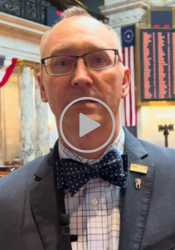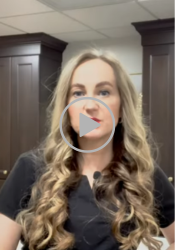
Be part of dentistry's voice in Madison
Why WIDPAC?
State government plays a vital role in how you practice
dentistry every day. From taxation, insurance and regulation to scope of
practice, workforce and licensing, the Legislature makes decisions
affecting every aspect of the dental profession in Wisconsin.
The Wisconsin Dental Political Action Committee (WIDPAC)
pools financial contributions from WDA dentists and directs them to
state-level candidates with solid records of supporting dentistry and
oral health. Positive relationships established through WIDPAC have
helped position the WDA as a trusted, dental-positive resource for state
lawmakers and create a political environment where dentists are asked
about, listened to and valued for their public policy views.
WIDPAC support is not tied to party affiliation. We support candidates and lawmakers who support us. WIDPAC exists to help safeguard against counter-productive legislation and to ensure that the Wisconsin Dental Association has a constant, prominent presence at the State Capitol. When lawmakers in Madison address issues affecting the practice of dentistry, WIDPAC is hard at work making your voice heard.
WIDPAC 101
Our dentists put together this series of videos to explain how WIDPAC works and why your contributions matter.
Video 1: What
is a
PAC?
.png?sfvrsn=c636c695_0)
Dr. Emily Eckdahl explains how PACs help groups like the WDA build positive relationships with lawmakers.
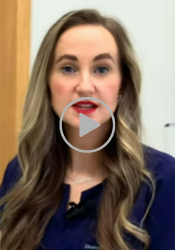
Dentists can give to WIDPAC in two ways - unrestricted and direct giver, where you decide which candidates benefit from your contribution.
Video 5: What about
member dues?
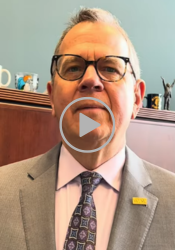
Member dues support WDA advocacy to a point, but Executive Director Mark Paget explains that state law forbids associations to use dues for political contributions.
It's worth
it

Drs. Ryan and Emma Dodge ask: What would you spend to make sure Wisconsin’s laws and public policies support your practice, your patients and oral health?
Video 7: A young
dentist's perspective
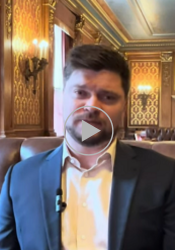
Dr. Drew teDuits gives because young dentists have the most to gain – and lose – when lawmakers make oral health decisions.
Two ways you can join WIDPAC
By law, WDA membership dues cannot be used to support political candidates. WIDPAC giving is funded entirely by the voluntary individual contributions of member dentists. There are two ways you can participate:
- Direct Giver: Your contribution goes into a non-interest bearing account and, upon your approval, is disbursed to specific state candidates – keeping your money in your control.
Wisconsin law requires that PAC contributions come from individuals only – your contribution must come from a personal account and not a business or organization. You can choose to give once a year, or make monthly contributions.
All contribution amounts are welcome. The following levels receive special recognition, including a dated lapel pin, dedicated WIDPAC communications and WDA Journal and WDA.org listings.
- Bronze: $50
- Silver: $250
- Gold: $500
- Platinum: $1,000+
WIDPAC Successes
Positive lawmaker relationships built through WIDPAC have made the WDA a leader in oral health advocacy. Legislative victories made possible by WIDPAC include:
- Secured $2.2 million in 2025-2026 state funding to expand hygienist and auxiliary training programs that will add 200 graduates per year to Wisconsin's dental workforce
- Authorized Expanded Function Dental Auxillaries (EFDAs) adding more skilled hands in clinics statewide
- Passed Wisconsin's Assignment of Benefits law for faster, direct payments to dentists
- Secured $2.2 million in 2025-2026 state funding to expand access for patients with special needs.
- Helped launch - through fundraising and state advocacy - Marquette's new urgent and special care clinic
- Passage of Assignment of
Benefits legislation, putting patients – not insurance companies – in
charge of their dental benefits. (2024)
- Entering Wisconsin
into the Interstate Dentist and Dental Hygienist Compact, supporting
license portability by authorizing states to coordinate standards to
allow qualified dentists and dental hygienists to practice across state
lines (2024)
- New scholarships for Marquette University School of Dentistry students who agree to practice in Wisconsin dental health shortage areas upon graduation, keeping more dentists in Wisconsin and serving vulnerable populations (2024)
- Inclusion of $20 million in the 2023-24 State Budget to train more dental professionals at Wisconsin technical colleges (2023)
- Authorization of Expanded Function Dental Auxiliaries (2022)
- Passage of historic 40% dental Medicaid reimbursement increase (2022)
- Passage of Wisconsin’s first dental Medicaid Pilot Program, which increased Medicaid reimbursement rates in 4 counties (Brown, Marathon, Polk and Racine) and is still in effect today (2016)
- Authorization of charity care licensing for out-of-state providers (2014)
- Establishment of a common informed consent standard for specialty healthcare providers, including dentists (2014)
- Enactment of non-covered services legislation that prevents dental insurance companies from setting fees for services they don’t cover (2013)
- Updates to Wisconsin’s dental scope of practice to reflect the American Dental Association definition of dentistry (2013)
- Regulation of mobile dental clinics (2012)
What is a political action committee?
What is WIDPAC?
What does WIDPAC do for me?
State government plays a vital role in how you practice dentistry every day. From taxation, insurance and regulation to scope of practice, workforce and licensing, the Legislature makes decisions affecting every aspect of the dental profession in Wisconsin.
WIDPAC exists to help safeguard against counter-productive legislation and to ensure that the Wisconsin Dental Association has a constant, prominent presence at the State Capitol. When lawmakers in Madison address issues affecting the practice of dentistry – including the dental workforce shortage, dental insurance reform, Medicaid reimbursement and more – WIDPAC is hard at work making your voice heard.
Who oversees WIDPAC?
WIDPAC is supervised by a diverse committee of WDA member dentists that reports directly to the WDA Board of Trustees. Current committee members include:
- Dr. Emily Eckdahl (Brookfield), chair
- Dr. Timothy Cooper (Stevens Point) – Treasurer
- Dr. Edward Chiera (Beloit) – Secretary
- Dr. Russell Christian (Mt. Horeb)
- Dr. Colleen Greene (Milwaukee)
- Dr. Peter Hehli (Appleton)
- Dr. Pat Tepe (Verona) – WDA Legislative Advocacy Committee Chair
- Dr. Chris Hansen (Two Rivers) – WDA President-Elect
- Dr. Christopher Johnson (Eau Claire) – WDA President
- Dr. Tom Reid (Madison) – WDA Vice President
Additionally, all WDA past-presidents are invited to participate on the WIDPAC committee.
Who decides where WIDPAC money goes, and how?
WIDPAC is governed by a set of bylaws and supervised by a diverse committee of WDA member dentists that reports directly to the WDA Board of Trustees. PAC support is determined by the WDA’s Government Services team and approved by members of the WIDPAC Board.
WIDPAC support is based on a variety of factors, including candidates’ support of our legislative issues, key committee assignments, bill sponsorship and co-sponsorship, and sustained constituent relationships.
I already pay membership dues. Why should I make a separate contribution to WIDPAC?
Federal and state law prohibits associations and other organizations from using member dues for political contributions.
Legislative advocacy is one of the most important things WDA does for member dentists, and dues dollars support this in a number of ways. They support our legislative office and talented government services staff in Madison. They allow the WDA to work with a highly respected and experienced contract lobbying firm. They support events like the WDA’s biennial Legislative Day and component legislative nights, and they support research and the development of position papers and other materials to help communicate WDA’s policy views.
These are all essential parts of advocacy, but they work better with a strong WIDPAC. By law, that depends on the voluntary, separate contributions of WDA members. Dues do not and cannot go to candidates.
What percentage of my contribution actually goes to candidates?
Why should I join WIDPAC instead of contributing directly to candidates?
Are WDA members required to join WIDPAC?
Can I contribute to WIDPAC through my dental practice?
Is my WIDPAC contribution tax-deductible?
Which political party does WIDPAC support?
Does the WDA endorse political candidates?
Who is WIDPAC supporting this election cycle?
How are WIDPAC contributions delivered to candidates?
What is the difference between “unrestricted giving” and “direct giver?”
With unrestricted giving, funds are kept in one large account and used at the discretion of the WIDPAC Board. Contributions go to state-level candidates – on both sides of the aisle – who are proven supporters of oral health, as well as those in leadership positions.
The direct giver option keeps your money entirely in your control. Your contribution goes into a non-interest bearing account and – upon your approval – is disbursed to specific state candidates.
Isn’t WIDPAC just buying votes?
Are PACs legal?
Does WIDPAC report its contributions and expenditures?
Who sees how much I give to WIDPAC?
Is WIDPAC successful?
Yes. WIDPAC has a proven track record of success. WDA legislative victories made possible by WIDPAC include the authorization of Expanded Function Dental Auxiliaries in the state, the addition of $2.2 million in 2025-2026 state funding to expand hygienist and auxiliary training programs that will add 200 graduates per year to Wisconsin's dental workforce, authorized Expanded Function Dental Auxiliaries (EFDAs) adding more skilled hands in clinics statewide, passed Wisconsin's Assigment of Benefits law for faster, direct payments to dentists, and more.

